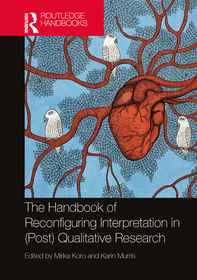
The Handbook of Reconfiguring Interpretation in (Post) Qualitative Research
-
10% KEDVEZMÉNY?
- A kedvezmény csak az 'Értesítés a kedvenc témákról' hírlevelünk címzettjeinek rendeléseire érvényes.
- Kiadói listaár GBP 230.00
-
109 882 Ft (104 650 Ft + 5% áfa)
Az ár azért becsült, mert a rendelés pillanatában nem lehet pontosan tudni, hogy a beérkezéskor milyen lesz a forint árfolyama az adott termék eredeti devizájához képest. Ha a forint romlana, kissé többet, ha javulna, kissé kevesebbet kell majd fizetnie.
- Kedvezmény(ek) 10% (cc. 10 988 Ft off)
- Kedvezményes ár 98 894 Ft (94 185 Ft + 5% áfa)
Iratkozzon fel most és részesüljön kedvezőbb árainkból!
Feliratkozom
109 882 Ft

Beszerezhetőség
Még nem jelent meg, de rendelhető. A megjelenéstől számított néhány héten belül megérkezik.
Why don't you give exact delivery time?
A beszerzés időigényét az eddigi tapasztalatokra alapozva adjuk meg. Azért becsült, mert a terméket külföldről hozzuk be, így a kiadó kiszolgálásának pillanatnyi gyorsaságától is függ. A megadottnál gyorsabb és lassabb szállítás is elképzelhető, de mindent megteszünk, hogy Ön a lehető leghamarabb jusson hozzá a termékhez.
A termék adatai:
- Kiadás sorszáma 1
- Kiadó Routledge
- Megjelenés dátuma 2025. december 30.
- ISBN 9781032848303
- Kötéstípus Keménykötés
- Terjedelem272 oldal
- Méret 246x174 mm
- Súly 453 g
- Nyelv angol
- Illusztrációk 22 Illustrations, black & white; 22 Halftones, black & white; 3 Tables, black & white 700
Kategóriák
Rövid leírás:
The Handbook of Reconfiguring Interpretation in (Post) Qualitative Research addresses different roles, functions, and reconfigurations of interpretation in qualitative and postqualitative research.
TöbbHosszú leírás:
The Handbook of Reconfiguring Interpretation in (Post) Qualitative Research addresses different roles, functions, and reconfigurations of interpretation in qualitative and postqualitative research.
This book connects interpretation to its histories while revisioning and reconfiguring what the future of interpretation and interpretive practices could be like and how different interpretations can shape qualitative and postqualitative relationalities, discourses, affects, and materialities. It addresses different roles, functions, and reconfigurations of interpretation in qualitative and postqualitative research. What happens to interpretation when it is put into different theoretical frames including postmodernism, posthumanism, postcolonialism? What has changed and how do different epistemological and ontological spaces offer different insights about interpretation and shape diverse uses for interpretation? How does interpretation function and what does it produce during these rapidly shifting cultural and political times?
This Handbook can be used as a main text for introduction to qualitativeresearch courses, advanced courses focusing on interpretation, post qualitative research practices, or social science methodologies. It could also be used as a supplementary textbook for qualitative methods courses including qualitative design, representation, and (post)practices courses.
TöbbTartalomjegyzék:
Part I: Conceptualizing Interpretation 1. Diverse Lives of Interpretation 2. Interpretation in Qualitative Research: Historical Roots 3. Multispecies as a Concept and Method; Part II: Interpretive Practices and Processes 4. Wriggling with Data and Interpretation 5. Amoeba in the Academia: Interpreting the Landscapes of Digitalized Higher Education 6. Doing Interpretation Differently with Posthumanism and New Materialism: Reconceptualizing what Data does in Postqualitative Research 7. Mountains and Geological Time: A Qualitative Quest; Part III: Interpretation Diffracted 8. Diffraction 9. Diffractive Analysis and Interpretation 10. Reconfiguring Interpretation in Relation to Reflexivity and Diffraction in (Post) Qualitative Research; Part IV: The Interpretation Question? 11. Criticality and Critical Interpretation as Intra-pretation in Post-Qualitative Research 12. A Childlike Questioning Exercise on Method for Researchers 13. Childing Methodologies: Image-ning without a Subject in Performative Videography 14. Making Care: Multimodalities and Interpretations, Methods and Becomings; Part V: Collective Interpretations 15. Collective Biography in Education Research: Exploring Feminist, Decolonial, Poststructuralist, and Posthumanist Perspectives 16. (Re)engaging Feminist Collective Interpretation Towards Ecosystems of Sustainability 17. Interpretation and Intra-pretation in Communities of Philosophical Enquiry: A Post/qualitative Research Methodology
Több



